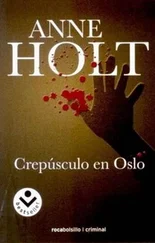“Bingo!”
A slip of paper had fallen to the floor. She snatched it up, a neatly folded A4 sheet. At the top, written by hand, was the word “South.” Below it followed a list of numbers, in groups of three with hyphens between them: 2-17-4, 2-19-3, 7-29-32, 9-14-3. And so it went on right down the page.
They stared at it long and hard.
“It must be a code,” Håkon declared, regretting the words as soon as they left his mouth.
“You don’t say,” Hanne replied with a smile, folding the sheet carefully again and placing it in a sealable plastic bag. “We’ll have to try to crack it then,” she said emphatically, and put the bag in the case they’d brought with them.
* * *
Peter Strup was an extremely active man. He lived life at a pace which at his age would have made all the doctors’ warning lights flash, if it weren’t for the fact that he kept himself in such impressively good physical shape. He was in court thirty weeks a year. In addition to that he took part in protest meetings, TV programmes, and public debates. He had published three books in the last five years, two about his many exploits, and one pure biography. All of them, published just the right length of time before Christmas, had sold well.
He was in the lift on his way up to Karen Borg’s office. His suit showed good taste, a deep reddish-brown flannel. His socks matched the stripes on his tie. He looked at himself in the huge mirror that covered the whole of one wall of the lift. He drew his fingers through his hair, adjusted his tie, and was annoyed to see a hint of grime around his collar. As the wood-trimmed metal doors slid open and he took a step out into the corridor, a young woman came through the big glass doors embellished with white numerals to reassure him he was on the right floor. She was fair-haired, quite attractive, dressed in a suit that was almost exactly the same colour and material as his own. Seeing him, she stopped in astonishment.
“Peter Strup?”
“Mrs. Borg, I presume,” he said, offering his hand, which she took with only momentary hesitation.
“Are you on your way out?” he asked, rather superfluously.
“Yes, but only to get myself a few things. Come on in,” she replied, turning back.
“Was it me you wanted to see?”
He confirmed that it was, and they went into her office together.
“I’ve come about your client,” he said when he’d sat down in one of the deep armchairs with a little glass table between them.
“I really would be very happy to take him over from you. Have you discussed it with him?”
“Yes. He won’t agree to it. He wants me. Would you like a cup of coffee?”
“No thanks, I don’t want to take up too much of your time,” Peter Strup replied. “Do you have any idea why he’s insisting on having you?”
“No, I don’t, actually,” she said, amazed at how easily she found herself lying to this man. “Perhaps he simply prefers a woman.”
She smiled. He gave a short but charming laugh.
“This isn’t meant to sound insulting,” he asserted, “but with all due respect, are you conversant with criminal law? Are you aware of all the courtroom procedures in criminal trials?”
She bristled angrily as she considered her response. Over the course of the last week she had been teased by her colleagues, bullied by Nils, and reproached by her snobbish mother for having taken on a criminal case. She was fed up with it. And Peter Strup would have to bear the brunt. She slammed her hands down on the desk.
“Quite honestly I’ve had just about enough of everybody pointing out my incompetence. I’ve had eight years’ experience as a lawyer, following on from damn good results when I graduated. With all due respect, if I may use your own words, how challenging will it actually be to defend a man who has admitted to a murder? Won’t it be fairly plain sailing, with a few well-chosen words about his difficult life before the summing up and sentencing?”
It was unusual for her to boast, and she wasn’t normally short-tempered. But it gave her quite a buzz. She could see that Strup was uneasy.
“Of course, I’m sure you can handle it,” he said soothingly, like a benevolent examiner. “I didn’t mean to offend you.”
As he went out he turned with a smile and added, “But the offer is still there!”
Having closed the door, Karen rang police headquarters. She eventually got a surly switchboard operator, and asked for Håkon Sand.
“It’s Karen here.”
He was silent, and for a fraction of a second she felt again the weird tingle of excitement that had arisen between them before the weekend, but that she’d almost forgotten about in the meantime. Perhaps because she preferred to.
“What do you know about Peter Strup?”
Her question broke the atmosphere of wariness, and she could hear the surprise in his voice as he answered.
“Peter Strup? One of the most competent defence lawyers in the country, maybe even the best; practising since time immemorial, and a damned nice guy, too! Clever, very well known, and not a skeleton in his cupboard. Married to the same woman for twenty-five years, three successful children, and a modest detached suburban house in Nordstrand. I read the last bit in the tabloids. What about him?”
Karen told her story. She was factual, adding nothing and omitting nothing. When she’d finished, she declared:
“There’s something very fishy about it. He can’t be short of work. And he went to all the trouble of coming to my office! He could have phoned again.”
She sounded almost indignant. Håkon was immersed in his own train of thought, and said nothing.
“Hello?”
He came back to life.
“Yes, I’m still here. No, I can’t explain it. He probably just called in because he was in your neighbourhood.”
“Well, maybe, but then it was strange that he didn’t have a briefcase or documents of any kind with him.”
Håkon couldn’t help but agree, though he said nothing. Absolutely nothing. But his brain was working so hard that Karen might almost have heard it.
This is a book code. That much is self-evident.”
The elderly man had the confidence of his expertise. He was sitting in the canteen on the sixth floor with Hanne Wilhelmsen and Håkon Sand.
He was good-looking, slim, and remarkably tall for someone of his generation. His hair might have been thinner than it once was, but there was still enough of it to present an imposing grey-white mane, combed back and recently trimmed. He had strongly defined features and a straight North European nose with reading glasses elegantly perched on the tip. He was neatly dressed, in a maroon sweater and stylish blue trousers. His hands were steady as they held the paper, and there was a narrow wedding ring tightly ingrown on the third finger of his right hand.
Gustaf Løvstrand was a retired policeman. His background was in military intelligence during the War and for a few years afterwards, until he turned to a more public-service orientated career in the police force. He was thoroughly dependable, well liked and highly respected by his colleagues before he was transferred to the Special Branch, where he had ended his career as a consultant. He’d had the unalloyed pleasure and satisfaction of seeing all three of his children in police-related jobs. He adored his wife and his roses, enjoyed his retirement, and was ready to assist anybody who regarded him as still having something to contribute.
“It’s easy to see it’s a book code. Take a look at the numbers,” he said, laying the piece of paper flat on the table and pointing at the string of figures:
2-17-4, 2-19-3, 7-29-32, 9-14-3, 12-2-29, 13-11-29, 16-11-2.
Читать дальше












